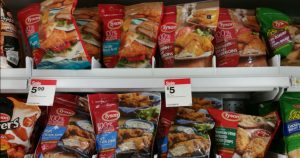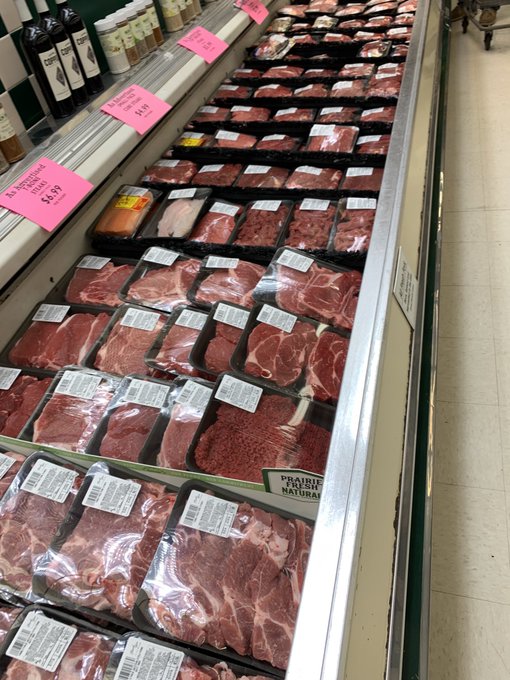COVID-19 Impacts-Plenty of Food “In the System,” But Guest Worker Concerns Persist
 Ryan McCrimmon and Catherine Boudreau reported on Wednesday at Politico that, “Don’t be fooled by the barren grocery store shelves: There’s plenty more food on the way.
Ryan McCrimmon and Catherine Boudreau reported on Wednesday at Politico that, “Don’t be fooled by the barren grocery store shelves: There’s plenty more food on the way.
Meat, dairy and produce groups as well as federal regulators say the U.S. has an ample amount of products in cold storage to handle the unexpected demand for food and household products from Americans.
“The latest Agriculture Department data shows record-high stocks of frozen poultry, cheeses like American and Swiss and red raspberries, while frozen pork supplies are up 11 percent from last year.”
“Be patient. Be kind to one another and our associates. Shop responsibly and purchase what you need, knowing that we will continue to replenish.” – @Kroger Chairman and CEO Rodney McMullen
The Politico article added that, “Rice producers, whose grains have been flying off of store shelves along with other inexpensive and long-lasting foods, say there’s no shortage and those items are being ‘quickly replenished.’”
“On Tuesday, federal meat inspection agencies said they continue to operate as normal. Food imports continued to flow across the Southern border despite restrictions on nonessential travel. And the Trump administration and grocery executives stressed that the supply chain is holding firm, even if consumers see long lines at stores across the country.”
Wednesday’s article noted that, “Meanwhile, the White House and Congress are on the verge of what could be a $1 trillion stimulus package for workers and industries like airlines and small businesses. It will likely include at least $1 billion in extra food assistance, which could see more demand as restaurant workers, service employees and other Americans are laid off or forced to stay home for an indefinite amount of time.”
Today, the Senate passed the Families First Coronavirus Response Act, which includes more than $1 billion to provide healthy food to families, children, and seniors. Ranking Member Stabenow’s statement:
Nonetheless, McCrimmon and Boudreau pointed out that, “One potential threat to the food supply is the temporary shutdown of U.S. embassies and consulates in Mexico, effective Wednesday, which help process visas for seasonal farm workers, according to the American Farm Bureau Federation.
“The U.S. agriculture industry has already been dealing with chronic labor shortages for at least a decade, and without comprehensive immigration reform, has increasingly relied on the H-2A temporary agricultural worker program.”
Happy to report the meat counter in my local grocery store is fully re-stocked.
More narrowly on the labor issue, DTN Ag Policy Editor Chris Clayton reported this week that, “Even as the president of the American Farm Bureau Federation was on a conference call talking about the importance of ensuring H-2A workers continue getting visas, the U.S. State Department on Wednesday halted processing of all routine visas in most countries around the world.
“The visa move could make the labor market for farm labor even tighter than the complications producers have already faced in recent years, noted Zippy Duvall, president of the American Farm Bureau Federation.
The COVID-19 pandemic has wrecked markets, daily business and community life, but farm groups are also stressing reaction to the pandemic could disrupt food production in the coming months if guest workers are shut out of the country.
Mr. Clayton explained that, “Most farm groups collectively right now have not organized a specific request to Congress for a stimulus package. Yet, in response to requests from the U.S. Cattlemen’s Association and others for aid to livestock producers, Sen. Mike Rounds, R-S.D., on Wednesday introduced a bill to provide a specific payment to cattle producers due to losses from COVID-19.”
The DTN article added that, “Dale Moore, AFBF’s executive vice president, acknowledged some type of aid comparable to the Market Facilitation Program will likely be created, citing the three tranches of payments made under last year’s program.
“‘I have a feeling it won’t be too long before we’re talking about a fourth or a fifth tranche depending how long it takes this virus to work its way out of the economy,’ Moore said.”

Meanwhile, Reuters writer Tom Polansek reported on Wednesday that, “Major U.S. chicken companies are diverting supplies to grocery stores from restaurants to meet red-hot demand as shoppers, unnerved by worries over the new coronavirus, stock their freezers to the brim as they isolate at home.
In addition to redirecting supplies, some producers are adding shifts to slaughterhouse operations. Even so, speed-ups face one constraint: chickens don’t grow any faster during a crisis.
“Perdue Farms and Pilgrim’s Pride said they are shifting chicken meat toward supermarket customers, after states ordered restaurants to shut dining rooms. Sanderson Farms plans to process more chicken for retail customers this weekend.”
The Reuters article pointed out that, “Shoppers have favored chicken during the coronavirus crisis in part because it is more affordable and freezes better than other meats, analysts said. Inventories of frozen chicken reached a record high 957.5 million pounds this year, according to the U.S. Department of Agriculture.”
Source: Keith Good, Farm Policy News






